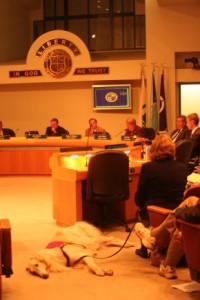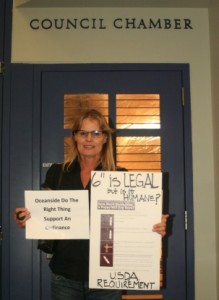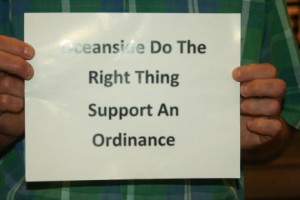Council rejects ‘puppy mill’ law to ban retail sales of commercially bred dogs

Commercial breeders and pet stores win latest battle over proposed city ordinance to regulate retail puppy sales. / Photo: Katerina Lorenzatos Makris
by Katerina Lorenzatos Makris ~
After a four-hour hearing peppered with heated moments, the Oceanside city council rejected a proposed ordinance that would have made it illegal for pet stores to sell dogs “not obtained from the shelter or from tax-exempt rescue organizations.”
In a 3 to 2 vote last night lawmakers in the southern California city declined a measure introduced by Council Member Esther Sanchez, who said one of her main goals was to ban retail sales of animals coming from commercial breeding establishments, more commonly known as “puppy mills.”
Mayor Jim Wood voted with Sanchez in favor of the ordinance, while the remaining council members, Jack Feller, Gary Felien, and Jerome M. Kern, all turned it down.
Defining ‘puppy mill’
Amidst a volley of questions about terminology, Sanchez defined puppy mills as “commercial breeding operations where a female dog is caged however long that female is able to breed, with no exercise. That’s a puppy mill. Unhealthy conditions. Inbreeding. Basically producing unhealthy puppies.”
Jim Kilby of the group Friends of Oceanside quoted from a court case that described puppy mills as mass-breeding facilities “in which the health of the dogs is disregarded in order to maintain low overhead and maximum profits.”
Other speakers detailed what they alleged to be poor conditions and care in such facilities, resulting in severely matted hair, skin sores, various other untreated ailments, extremes of heat and cold, and emotional dysfunction in dogs who breeders keep in small cages for years, providing little or no veterinary care, human interaction, socialization, or recreation while the animals produce multiple litters of offspring for them to sell.
‘Commercially sanctioned animal cruelty’ or ‘legitimate business’?

Alleged animal neglect: Skin sore on rump of dog in Kennel of Joy, Missouri / Photo: Katerina Lorenzatos Makris (from poster displayed at Oceanside hearing)
David Salinas, owner of pet shops Oceanside Puppy and San Diego Puppy told council members that the companies who supply animals to his stores “are regulated by federal and state standards. On top of that we don’t work with breeders that have direct violations that have directly to do with the welfare of the animal. They may have indirect violations like the food bowl wasn’t covered. OK, well, that needs to be fixed. But that’s not a bad breeder. If a breeder has a direct violation, something having to do with the welfare of the animal, we cut them off.”
Salinas argued further that if the council were to pass the ordinance, “You’re putting me out of a job. You’re putting my employees out of a job. I just want to remind you guys of liberty. We have the right as citizens, as a legal business owner who’s the backbone of Oceanside, to run a legitimate business.”
“It’s disappointing,” local shelter head Michelle Quigley commented in an interview with Animal Issues Reporter (AIR) after the thumbs-down vote. Senior director of the San Diego Humane Society and SPCA North Campus, Quigley said, “We thought they would hear the needs of the community. We support this ordinance. As long as people continue to buy puppies from pet stores, those commercial breeding establishments will continue to stay in business and to thrive. It’s commercially sanctioned animal cruelty.”
‘Attacking each other didn’t help’
Oceanside contracts its animal control services to the SD Humane shelter for one million dollars to care for the 9,000 unwanted dog, cats, rabbits, and other species who enter its doors annually. Quigley said that some percentage of those animals come from large-scale commercial breeders—at least 25% of dogs they take in are purebreds—and that the number could rise if Salinas’s Oceanside Puppy store or others like it are allowed to continue selling animals who might eventually end up homeless.
Quigley believed the ordinance might have failed because “some of the facts were lost” during the emotionally charged meeting. “There were a lot of subjective statements being made by both sides, quite frankly. For something like this you really need to have statistics and data. It just wasn’t presented. And both sides attacking each other didn’t help. The focus got lost. But we’ll continue to support the city, and if they want to address this and revisit it sometime down the road we’ll certainly be ready to answer questions and gather some of the data and go from there.”
‘Unfair ordinance’

Highly vocal participants made their feelings known on both sides of Oceanside City Council meeting to discuss proposed ban on retail puppy sales / Photo: Katerina Lorenzatos Makris
Council member Kern explained that he was voting “no” on the ban in part because of the inflammatory rhetoric he said was used by its supporters.
“All I’ve heard is emotion and some extrapolated statistics,” he admonished the pro-ordinance speakers. “If that’s going to be your attitude I will never support anything you bring forward.”
During a brief break in the long meeting Mayor Jim Wood told AIR, “We want an ordinance that says you can’t buy and sell from puppy mills. I think that’s simple enough. But we’ve gotten off track. I don’t want to have dogs brought here from puppy mills. That’s what this whole ordinance is about.”
Wood explained that he has strong feelings on the issue because during visits to commercial breeding establishments in San Diego county and in other states he was appalled by the poor care the animals received.
Salinas maintained that commercial breeders have improved. “Just like any industry it evolves. In the 1980s it wasn’t the same as in 2013. I guarantee that. They’re only getting better and better.”
“I love puppies,” Salinas added. “I’m a nice guy. I try to be nice. I always try to make it right and do it right. I follow every single state and federal law. I pay my taxes. Don’t punish us. This is an unfair ordinance.”
Not aimed at ‘reputable’ breeders

Dog dozed peacefully in Oceanside City Council chambers while controversy raged all around / Photo: Katerina Lorenzatos Makris
Individual breeders as well as representatives of breeder groups told the council that they should not be targeted by any new ordinance.
“I’m an Oceanside resident and a dog lover,” said Cheryl Yoder of Yoder Labradors. “I have to agree with all of you guys about all that horrible stuff that happens to dogs. That’s just sickening. But I also have to be a voice for many of my friends who are dog breeders and dog showers and have very clean establishments. I just need to be a voice saying that if you regulate this you have to make sure about the way you word it so that reputable people aren’t hurt.”
When Sanchez asked city attorney John Mullen to weigh in on the question, he replied, “Many of these ordinances—I think there are 13 now in the great cities of California that have adopted these types of ordinances—they vary from city to city but many of them have explicit exemptions for breeders. The city of San Diego has an exemption for breeders. Dana Point has an exemption. So I feel confident that if it were the direction of city council to create that kind of exemption that we would be able to craft the language. I would want to make sure we have very specific objective language so that it’s not subjective and potentially over-broad and vague. So that would be a concern and the devil would be in the detail, but I do think that we could put something forward that would be legal, at the direction of the council.”
Local animal welfare groups won’t give up fight against puppy mills

Leslie Davies and her group Friends of Oceanside supported the proposed ban / Photo: Katerina Lorenzatos Makris
Leslie Davies, whose group Friends of Oceanside supported the proposed ordinance, told AIR after the law failed to pass, “I’m very, very disappointed. But I don’t think this is the end of it. I think we might bring it up again with this council. Or if we don’t make any headway with this council, we’re definitely going to bring it up again with the next city council.”
She added, “Hopefully we’ll be out there protesting his [Salinas’s] store and I’ll be holding my sign that says “$39 to $69 Available Now” with photos of all the dogs that are spayed/neutered and microchipped and available at our animal shelters. Also we’ll be passing out literature that tells where all the shelters are within a ten-mile radius of Oceanside, and that’s where people can go to get their pets.”
Heckles and scuffles
Opponents and proponents of the ban filled council chambers to capacity. They held up signs reading “Our Pets, Our Choice,” or “Oceanside Do the Right Thing, Support the Ordinance.” They frequently heckled some of the more than 50 speakers who presented their opinions on the issue.
An Oceanside police officer told AIR that at one point a scuffle occurred between two attendees with opposing views on the topic, but that officers quickly ended the altercation.
Good and bad
Speakers against the ordinance included Michael Stolkey of Hunte Corporation, described as the nation’s largest broker of commercially-bred puppies to pet stores. Salinas reportedly purchases most of his San Diego Puppy and Oceanside Puppy stores’ animals through Hunte.
“Our company is an industry leader in animal welfare, committed to the highest level of standards in animal husbandry, nutrition, veterinary practices, compliance and regulation,” Stolkey assured the council. “Unfortunately in any industry you’re going to have good and have bad. We work hard to separate them.”
Countering Stolkey, Zola Muhammad of San Diego Animal Defense Team alleged that “the USDA has cited them [Hunte] for keeping puppies in too-small cages, for transporting underage puppies, and other violations. They were also cited and fined by the Missouri Department of Natural Resources for clean water violations for having trenches of dead canines on their premises. In 2006 60 puppies were killed in a Hunte truck fire. All of the puppies were caged in a 40-foot trailer truck, and had already been transported 1,000 miles before they died.”
Muhammed said that Hunte processed 90 thousand puppies through their “assembly lines” last year, and they shipped 2,000 puppies a week to pet stores.
‘Humane business model’
Among the speakers in favor of the ordinance, Jen Tait of The Humane Society of the United States Hollywood office told the council that her organization offers to help pet stores take profitable steps away from selling animals from puppy mills so as to follow instead the “humane model” of companies who help find homes for rescued animals.
“The Humane Society opposes the sale of puppy mill puppies,” said Tait, “but we have no issue with the pet stores per se. Just this month our staff has worked with three different pet stores helping them convert from puppy sales to a humane business model that includes only sales from animal shelters and rescue groups. This is absolutely and unequivocally a viable business model. Not only have several small private pet shops made this change, the biggest and most successful stores in the nation, Petco and Petsmart, refuse to sell commercially bred dogs and instead find homes for homeless pets.”
Tait added, “We would be pleased to work with any pet store in Oceanside to help them make this transition. And if they’d rather not work with our organization we would be happy to put them in touch with pet store owners in southern California and across the country who made the switch to the humane model and are thriving.”
Please visit AIR again soon for more articles on the Oceanside hearing and on the issue of commercial dog breeding.
Get fresh AIR! Use the ‘SUBSCRIBE’ button above to be notified via email of new articles.
Katerina Lorenzatos Makris is a career journalist, author, and editor. Credits include hundreds of articles for regional wire services and for outlets such as National Geographic Traveler, The San Francisco Chronicle, Travelers’ Tales, NBC’s Petside.com, and Examiner.com (Animal Policy Examiner), a teleplay for CBS-TV, a short story for The Bark magazine, and 17 novels for Avon, E.P. Dutton, Simon and Schuster, and other major publishers.
Together with coauthor Shelley Frost, Katerina wrote a step-by-step guide for hands-on, in-the-trenches dog rescue, Your Adopted Dog: Everything You Need to Know About Rescuing and Caring for a Best Friend in Need (The Lyons Press).
Please respect copyright law. Sharing AIR links really helps! But copying more than a couple of paragraphs of content without permission is a no-no. If you’d like to use one of AIR’s entire articles or one of our photographs, kindly contact us at [airinfo AT yahoo DOT com].
Copyright © 2013 Animal Issues Reporter and AnimalIssuesReporter.com.
All rights reserved

Is it legal to picket a pet store that sells puppymill dogs? If it’s legal that’s what we should do. We don’t have to go inside the store; outside would be just as effective, if not more so. Plus, we need behavioral trainers at the shelters and rescues to work with the dogs and cats that end up there -to help them during this scary stage in their lives and ready them for adoption. We need also more foster homes for the rescues and shelters so that the dogs and cats hopefully will be ready for adoption sooner than if they were left in shelters and rescues.
I hope this issue is brought up when councilmembers Feller, Fetien, and Kern run for re-election. I hope the voters of Oceanside take these councilmembers’ support of the puppy-mill industry into consideration when they vote.